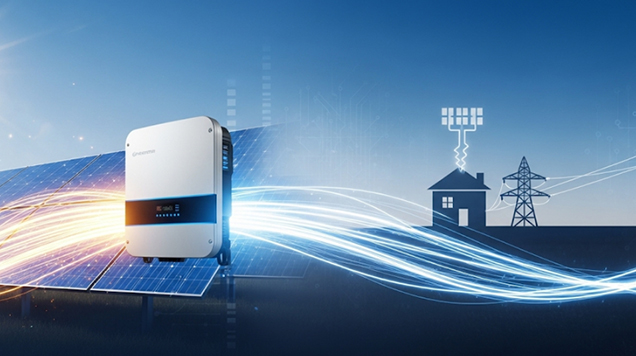All you need to know about the gateway of solar PV system : Solar Inverter
Why is a solar inverter important?
When we picture solar energy, the first thing that comes to mind is large panels. What we miss out on, is that it is not just the panels that generate solar energy. For sound functioning and usage of solar energy the most important thing is a solar inverter. A solar inverter is like a translator, it translates Direct Current (DC) to Alternating Current, making it into a usable energy source.
This is important as solar panels generate DC electricity, but regular households, businesses and appliances require AC electricity to run. So without the inverter, you’re essentially creating an abundance of solar energy that you can store (if you have a solar battery), but can’t actually use. For this reason, the solar inverter is often considered the ‘gateway’ of a solar system.
In addition to converting DC to AC, solar inverters provide a number of other capabilities and services to ensure that the inverter can operate at an optimal performance level. Inverter manufacturers also provide post-installation services that are integral to maintaining energy production and a high level of performance for the project.
How does a Solar Inverter benefit us? Aren’t they only functional while the sun’s out?
Solar Inverters play a major role in reducing harmful carbon emissions and in turn reducing your carbon footprint. Using solar power devices saves energy and have proven to be more economical than others in general. Solar inverters are energy-efficient and can be used to power up the AC appliances in your home without much hassle.
In a world where everyone wants to be eco-conscious, the first and foremost step towards a green living is to make use of the abundant resources to the best of it’s capacity. One can not just use solar energy for themselves, but also store it up in the form of solar batteries for future use. Solar inverters have been proven to be cost effective and more efficient when it comes to functioning of AC powered devices.
Long-lasting solar PV systems require a high-quality inverter with a robust convection cooling system.
What type of Solar Inverter should one invest in? Which inverter complies with my specific needs?
Here are the different types of Solar Inverters
Three Main Categories based on Use-Cases
- Off-grid Inverters:
Also known as stand-alone inverters, they do not need to be hooked up to a solar panel. In simpler terms, your devices use solar energy to function, and any excess energy will be deposited in a battery bank. Which will then be used at night times or days with less sun to ensure optimal supply of energy throughout. - Grid-tied Inverters:
Grid-tied inverters are connected to a utility grid, and function by matching their frequency with that of the utility grid sine wave. They are designed to automatically shut down in the event of a power cut for safety reasons. - Battery-Hybrid Inverters:
This is modern and it is a combination of both. It combines solar and battery storage in one. This means systems that are already connected to the electricity grid can start taking advantage of battery storage as well. Which in turn means you’re able to store solar energy that is generated during the day and using it at night.In conclusion, Solar Inverters have evolved from simply converting the electrical currents of a solar energy system. Inverters must continue to innovate and bring down cost while maintaining key attributes for a solar energy system in order to drive more photovoltaic (PV) penetration. This is all about the working of a solar inverter. It is an electrical device, used to convert DC to AC where DC is generated from a solar panel. It is eco-conscious and makes optimum use of optimally available natural resources, solar energy.

